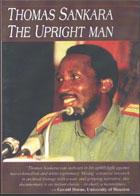
Thomas Sankara: The Upright Man 2006
Distributed by California Newsreel, Order Dept., PO Box 2284, South Burlington, VT 05407; 877-811-7495 (toll free)
Produced by Zorn Production International
Directed by Robin Shuffield
DVD, color, 52 min.
Sr. High - Adult
African Studies
Date Entered: 11/25/2008
Reviewed by Patricia B. McGee, Coordinator of Media Services, Volpe Library & Media Center, Tennessee Technological UniversityThomas Sankara was a paradoxical blend of enlightenment and rigidity. When he came to power in 1983 in Burkina Faso, the former Upper Volta, Burkinabe citizens had achieved little progress since independence in 1960 and were viewed as a source of cheap labor by neighboring countries. Sankara promoted women’s rights, the end of forced marriages and female mutilation, recruited competent women to serve in his government and encouraged them to join the military, launched vaccination programs, fostered reforestation programs to halt desertification, and encouraged universal participation in sport.
One of his first actions as leader was to reduce salaries of civil servants, eliminate special privileges, and insist on economy travel. He argued that foreign food was a form of colonial exploitation, “because the one who feeds you usually imposes his will upon you.” Sankara argued eloquently for agrarian self sufficiency, an emphasis on scientific and technological learning, a limitation on the arms race and for targeting Africa’s markets for African products. He insisted that “the imported corn, rice or millet: this is imperialism.” During his short four year tenure Burkina Faso became food independent.
Given his remarkable eloquence and charm and his not inconsiderable accomplishments, it becomes imperative to ask the question, “What went wrong?” Sankara prohibited opposition parties and unions; the country established People Revolutionary Tribunals where the rights of accused citizens were not guaranteed, and defendants had to prove their innocence. When he insisted civil servants wear native costume to work, most continued to wear western garb and simply kept “Sankara’s coming” clothes in their office to change into if he came on a surprise inspection. When the nation’s teachers struck, Sankara, unable to compromise, dismissed them all—a catastrophic blow for the nation’s school system. Revolutionary Defense Committees were headed by unqualified people; the ordinary citizens of Burkina Faso became disenchanted with the revolution. Sankara was undoubtedly a genuine threat to neo-colonialism, and in part Sankara’s violent overthrow came with the sanction of both France and Ivory Coast.
Thomas Sankara: The Upright Man is a engrossing blend of archival footage of Sankara himself, news footage of the day along with interviews with teachers, journalists, UN officials, and former government officials who were closely involved with the events of his brief career. Shuffield’s passionate look at the story of Sankara’s career presents the tragedy of lost opportunity; the gains achieved under his leadership have since been lost. This documentary is highly recommended for both public and academic libraries, and is indispensable for African Studies Programs.